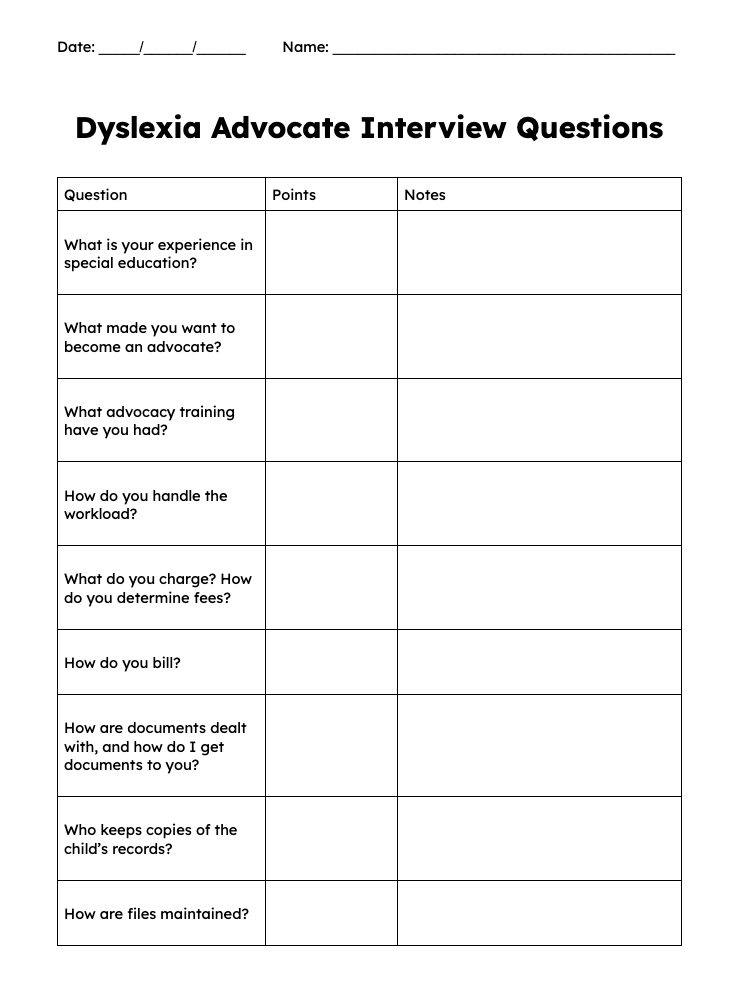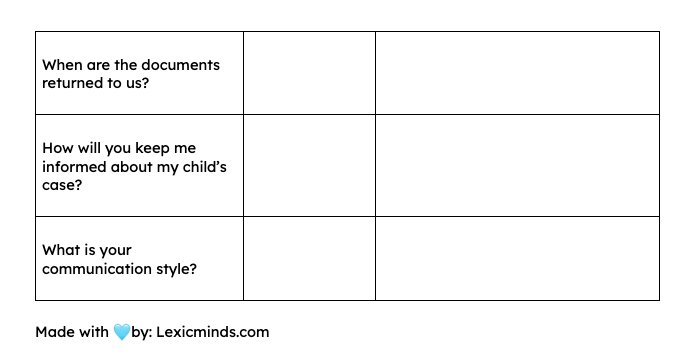As you sit in IEP meetings, it can feel like you are the only one really there for your child. Yes, IEP meetings are supposed to be a team effort, with everyone having a say. However, the reality is that you, as a parent, have different motivations than the school administrator or even the child’s teacher.
An advocate can help you bring one more person into your corner: hiring an advocate can help you focus on being your child’s parent, while the advocate, well, advocates.
Here’s our guide to get you an advocate who will fight for your child.
What is an educational advocate?
An advocate is a professional who can help get accommodations or services for children with different needs. They are trained in special education and advocacy. Basically, their job is to support parents during the special education process and to provide guidance and expertise about special education law and your child’s case.
It’s important to know that an advocate is not an attorney. While some may have a license to practice law, they are not lawyers.
Where to find educational advocates
The Council of Parent Attorneys and Advocates (COPAA) has lists of advocates. Each state also has a Parent Training and Information Center with information about advocates. However, the best place to find an advocate may be local parent groups on social media.
Ask about which advocates have been the most helpful, specifically for kids with Dyslexia.
Seeking advocacy support? We can find the right person for you. Just fill in this form, and we’ll find the right advocate for you.
Finding a Dyslexia advocate
Are they trained? Do they have experience?
There is no certification authority for advocates. This means you must look for an advocate with experience in special education. Ideally, they have been a teacher or school administrator, and you must look for someone who has had training in advocacy and the law.
An advocate should know about IEP meetings, diagnoses, reports, and how to read them, the IDEA law.
Question to ask: How do you keep up with the latest news about special education law? What training have you had? Why did you become an advocate?

Do they have expertise in Dyslexia? Will they learn about your child?
Choose an advocate willing to learn about and work with your child. Therefore, your advocate should be able to explain your child’s needs and how it impacts them in the education setting.
They don’t have to be a Dyslexia expert, but be willing to spend time with you and your child before any meeting so they can advocate well.
Questions to ask: How do you get to know the children you advocate for? What can I expect when working with you? How do you prepare for an IEP meeting? What experience have you had with Dyslexia?

How do they handle their limits?
Every advocate can help you negotiate and resolve conflicts, but they are not lawyers and should not act as such. Depending on your state, an advocate may or may not be able to represent you in due process hearings. Ideally, your case would not go to court, and it’s fine to work with an advocate until you need a lawyer, but the advocate should know the boundary and when to recommend legal representation.
Questions to Ask: What situations would make you recommend a lawyer? When would you recommend someone hire a lawyer?

How will they handle virtual meetings?
Especially now, many meetings are held online. So, knowing how an advocate handles virtual meetings and how they approach them differently than in-person meetings is important. At a minimum, your advocate should have their camera on and be ready to speak up when necessary.
Questions to Ask: Do you participate in virtual meetings? How do you handle advocating during virtual meetings? Will we prepare for virtual meetings?

How do you feel about this advocate?
Moreover, above all, you should feel comfortable sharing information with an advocate, and enjoy working with them. An advocate can be a godsend for parents who want to navigate the special education system as, well, parents. They can provide valuable advice and insights, and help you feel confident that the choices your school is making are the right ones for your child.
Ultimately, an advocate should feel like a trusted advisor who helps you make those decisions.

Dyslexia Advocate Interview Questions
You may be wondering: how can I know whether they are the correct person for my family? What questions should I ask a Dyslexia Advocate in an interview? We got your back.
- What is your experience in special education?
- What made you want to become an advocate?
- What advocacy training have you had?
- How do you handle the workload?
- What do you charge? How do you determine fees?
- How do you bill?
- How are documents dealt with, and how do I get documents to you?
- Who keeps copies of the child’s records?
- How are files maintained?
- When are the documents returned to us?
- How will you keep me informed about my child’s case?
- What is your communication style?
Self-reflection questions after the interview
- Do you feel comfortable working with this person?
- Are you confident this advocate has the skills and experience to handle your case?
- Did you understand everything the advocate was saying? Were they clear?
- Did they stop and explain terms or acronyms?
- Do you feel comfortable with the fees and fee schedule?
- Do you feel comfortable with how documents will be handled?
- Do you feel comfortable giving this person sensitive information about your child?
Find the printable document for your interview here.
Preview:
Key Takeaways
- An advocate can help you navigate the particular education system, offering expertise in special education law and individualized support for your child’s needs.
- It’s vital to choose an advocate with relevant experience, training, and a willingness to understand your child’s situation, especially regarding dyslexia.
- Beyond qualifications, you need to feel comfortable and confident in your advocate’s ability to represent your child’s best interests effectively.
Points of Action
- Fill in this Lexicminds form, and we will connect you with an advocate or tutor. We are here to support you!
- Connect with local parent groups to get personal recommendations for effective advocates who have experience with dyslexia and special education.
- Use the provided checklist to interview potential advocates, focusing on their experience, training, communication style, and how they handle virtual meetings. Confirm they are a good fit for your family’s needs and that you are satisfied working with them.
Written by:Â Samantha Cleaver
Samantha Cleaver, PhD, has more than 15 years of expertise in reading disabilities, including Dyslexia. She has taught students with Dyslexia in elementary and middle school and has worked as a school-level director of special education.Â
Disclaimer: This is not medical advice. Please consult with a licensed professional when in doubt. Lexicminds is not liable for actions taken from this page.








